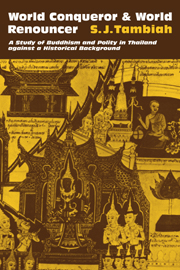 World Conqueror and World Renouncer
World Conqueror and World Renouncer Published online by Cambridge University Press: 10 November 2010
In a seminal essay Wyatt (1966) discussed the evidence for the thesis that the Buddhist monkhood was an avenue of social mobility or, to put it differently, that sons of farmers and peasants were able to enter the ranks of government service via the channels of religious education.
In Chapter 11 we have cited evidence that during the Ayutthaya era religious examinations were periodically held and that ranks and positions were given the learned monks. In fact the educated monks were favored with higher sakdina that paralleled the grading of secular positions in the king's service. We also remarked that it was conceived as a royal duty not only to authorize the holding of examinations but also to ensure that monks did assiduously engage in learning rather than find in the robe an excuse for indolence and a refuge from royal service.
Wat education included not only dhamma and Pali studies but also instruction in astrology, medicine, law. Wyatt surmises that wat education provided the stepping stone to employment in the king's service in the Department of Royal Astrologers, Department of Physicians, Department of Royal Scribes, and other departments dealing with religious and legal affairs.
We are on firmer ground later, in the Bangkok period, to follow the pattern of conversion from monkhood to advantageous lay status. As Tej Bunnag puts it: Traditional education “was based on the Buddhist clergy in provincial and metropolitan monasteries and on the corp of scribes under royal patronage.”
To save this book to your Kindle, first ensure [email protected] is added to your Approved Personal Document E-mail List under your Personal Document Settings on the Manage Your Content and Devices page of your Amazon account. Then enter the ‘name’ part of your Kindle email address below. Find out more about saving to your Kindle.
Note you can select to save to either the @free.kindle.com or @kindle.com variations. ‘@free.kindle.com’ emails are free but can only be saved to your device when it is connected to wi-fi. ‘@kindle.com’ emails can be delivered even when you are not connected to wi-fi, but note that service fees apply.
Find out more about the Kindle Personal Document Service.
To save content items to your account, please confirm that you agree to abide by our usage policies. If this is the first time you use this feature, you will be asked to authorise Cambridge Core to connect with your account. Find out more about saving content to Dropbox.
To save content items to your account, please confirm that you agree to abide by our usage policies. If this is the first time you use this feature, you will be asked to authorise Cambridge Core to connect with your account. Find out more about saving content to Google Drive.